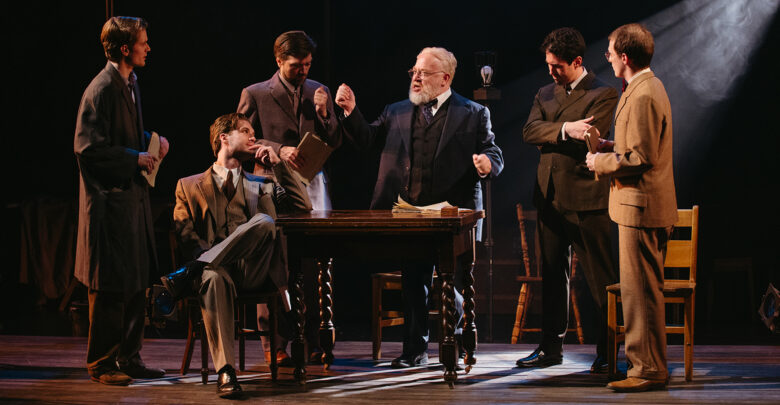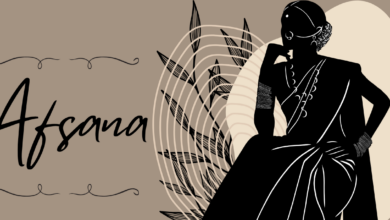Play Review: Indecent
New life is given to Sholem Asch’s story by an incredible cast and crew.
 Brianne Jang
Brianne JangIndecent is a play written by Paula Vogel, directed by Ben Smith, a Master’s of Fine Arts directing candidate at the University of Alberta. It’s a hilarious and heartbreaking story brought to life by an incredibly talented cast and crew.
A play about a play, Indecent explores The God of Vengeance by Sholem Asch, and the challenges it faced. Many people weren’t ready for Asch’s radical play when it premiered on Broadway in 1923. But, I think we are ready for it now.
The play follows Asch (Aidan Laudersmith) as his faith in his play wanes and the future for Jewish people becomes more bleak. The God of Vengeance, which is about a Jewish father and brothel-owner and his queer daughter, isn’t well-received at first. With optimism and excitement, Asch is able to find a cast and stage manager that believe in his play.
They find success, but only for a time. It is troubling to watch as the troupe finds that the play is less accepted in America than it is in Europe. Even more upsetting is the cast’s difficulty accepting themselves as Jewish people who speak Yiddish and struggle with English.
Asch’s play is a portrayal of queer love, both on and off the stage. The women who play Riffkele (Megan Holt) and Manke (Jacquelin Walters) can only openly express their love for women on stage. My heart broke as the original actress that plays Riffkele is fired from the play, losing the only space she could openly be herself. Holt and Walters delivered an incredible performance in every scene. They brought myself and many other audience members to tears.
Police arrest the cast and stage manager for obscenity immediately after the play’s Broadway premiere. The precedent the arrest sets is clear — Jewish and queer stories aren’t welcome on Broadway. However, Jewish people in Europe continue to cherish and perform The God of Vengeance. Even when it becomes illegal to do so during the Holocaust, which is referred to throughout the story. It is absolutely heart-wrenching to watch Asch stop believing in his play while it remains important to so many Jewish people.
Yes, there was a scene in an attic in one of the ghettos in Poland during that time and the years in the titles were before, during, and after the Holocaust. Asch also witnessed the escalating situation in Europe that led up to it off script.
Each cast member of Indecent plays multiple characters throughout the play and embodies each one to the fullest. The cast does an amazing job using singing to portray the story. The harmonies in the scene where the troupe is lined up at a concentration camp is hauntingly beautiful.
Riffkele and Manke’s performance in the rain scene was especially incredible. The rain scene is talked about frequently throughout the play. But, the audience is only shown parts of it. In the final scene, with rain coming down, we finally get to see the scene in its entirety. It is an expression of love and joy shared between two women, dancing and embracing in the rain. It ends the play in a heartbreakingly beautiful way.
Credit must be given to the musicians as well. The violinist (Guillaume Tardif), clarinetist (Kornel Wolak), and accordionist (Michael Bridge) set the rain scene and transported the audience to each setting with their performance.
The set remained largely the same throughout the different scenes. It was the lighting all throughout the play that took the audience to each new place. The simple changes in lighting, in addition to the music and the titles projected onto the curtain, set each scene perfectly.
During the play, titles were projected onto the curtain, which was raised and lowered at various times. It was a brilliant use of technology to project the words for the audience, providing context on the time and place of a scene. Yiddish is spoken several times throughout the play, and the English titles were always accompanied with the Yiddish translation. As mentioned in one of the titles, few plays are still performed in Yiddish. The significance of the use of Yiddish — verbally and written — isn’t lost on the audience.
In the opening scene, Lemml told the audience that he couldn’t remember how the story ends. But I don’t think it has. The story of Asch’s play, Jewish people, and queer people is ever-evolving and may be more important than ever. In telling the story of Asch’s play and the troupe that put it on, the story continues. In the laughing, crying, and applause of the audience, it lives on.
Indecent runs at the Timms Centre for the Arts until December 9. Tickets can be purchased here.




